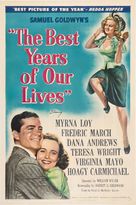Reviews provided by RottenTomatoes
Bosley Crowther, New York Times: It is seldom that there comes a motion picture which can be wholly and enthusiastically endorsed not only as superlative entertainment but as food for quiet and humanizing thought. Read more
Jonathan Rosenbaum, Chicago Reader: I'd call this the best American movie about returning soldiers I've ever seen -- the most moving and the most deeply felt. Read more
Dave Kehr, Chicago Reader: The film is very proud of itself, exuding a stifling piety at times, but it works as well as this sort of thing can, thanks to accomplished performances by Fredric March, Myrna Loy, and Dana Andrews, who keep the human element afloat. Read more
Richard Brody, New Yorker: Profoundly and sensitively balances the private demons of scarred veterans and the press of public policies that leave their mark on daily life. Read more
Kate Cameron, New York Daily News: As far as this review is concerned, it is the best picture to come out of Hollywood since the end of the war. Read more
James Berardinelli, ReelViews: The feeling of warmth and satisfaction that accompanies the conclusion is the hallmark of a great drama. Read more
Roger Ebert, Chicago Sun-Times: Surprisingly modern: lean, direct, honest about issues that Hollywood then studiously avoided. Read more
TIME Magazine: Like most good mass entertainments, this picture has occasional moments of knowing hokum; but unlike most sure-fire movies, it was put together with good taste, honesty, wit -- and even a strong suggestion of guts. Read more
Geoff Andrew, Time Out: Overlong, perhaps, but this tender and occasionally tough look at the plight of returning war veterans is one of Wyler's best films. Read more
Michael Atkinson, Village Voice: William Wyler's heartbreaking postwar ballad seems even more radical today than it did in its Oscar-thick heyday. It's as non-propagandistic as an unemployment line. Read more

